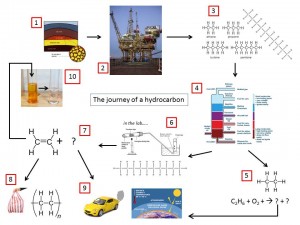Organic chemistry teaching resources
Worksheets and lesson ideas to challenge students to think hard about crude oil, alkanes and alkenes (GCSE and Key Stage 3)
The chemistry of carbon compounds is an exciting one. Why is it that organisms on earth have evolved to be primarily carbon based? What other elements could life-forms have utilised? Organic chemistry provides a great context to consolidate students’ understanding of bonding, chemical reactivity, enthalpy and separating techniques. It also opens the door to the fabulous world of polymer science.
Where to start?
A link to the Bloomberg Energy and Oil prices. Show your class the price of crude oil as you introduce alkanes – this will inspire any future oil tycoons in your class and show them the importance of distillation in producing more expensive products.
Fractional distillation of crude oil
A great animation to help students understand what is happening inside a fractional distillation column.
to help students understand what is happening inside a fractional distillation column.
GCSE worksheet on the language of fractional distillation of crude oil. The worksheet helps students correctly use the key terms: volatile, viscous, boiling point and fraction. Scaffolding is used to help students gain an understanding of these key terms so they can eventually write their own paragraph explaining how fractional distillation works. This resource was made in collaboration with Sana Badri. (PDF)
GCSE questions and activity on the fractional distillation of crude oil. Students think deeply about what would happen if the fractionating column was set up incorrectly. They are also given a photo of a range of different fractions and predict where in the column they formed. (PDF)
Fractional distillation – do pupils really get it?!
This video by Dr Ali Whiteford looks at how scientists tried to extract useful substances from peat on the Isle of Lewis using decomposition and distillation. This would be an interesting context for pupils studying fractional distillation at GCSE. You could use this resource to create some questions to check whether pupils have understood the principles behind fractional distillation once you have taught fractional distillation of crude oil.
Alkanes and Alkenes
GCSE worksheet on drawing alkanes. Students complete a simple table to write the displayed formula, molecular formula and name of the first seven alkanes. This could be easily adapted for alkenes. The exercise determines whether students understand the concepts of general formula and homologous series. (PDF)
GCSE worksheet to compare alkenes and alkanes. Students complete a modified Venn diagram to compare the structure, reactivity and properties of alkanes and alkenes. This can be completed in groups or individually. A word bank is provided to help support and focus students, if required. (PDF)
The journey of a hydrocarbon – combustion, polymers and cracking
GCSE worksheet on the journey of a hydrocarbon. Students use a series of images to describe the journey of a hydrocarbon. It helps students make links and understand how the processes of cracking, fractional distillation, combustion, polymerisation and global warming fit together. (PDF)
